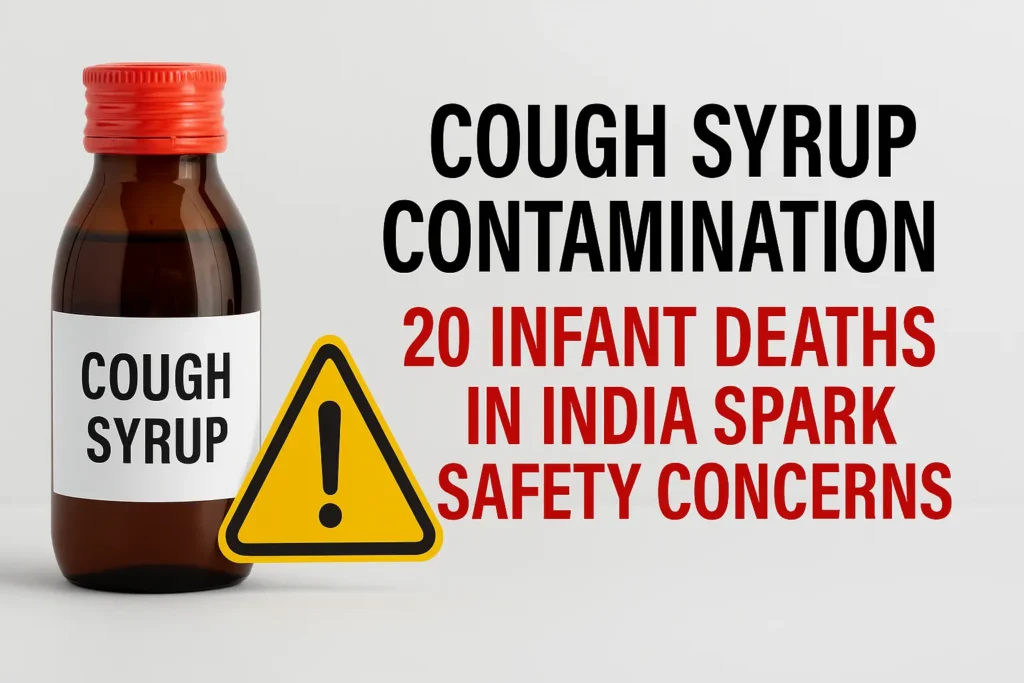An unfolding tragedy involving contaminated cough syrup has reportedly claimed the lives of at least 20 infants, with victims reported in Madhya Pradesh and Rajasthan.
The initial investigation failed to find contamination, but subsequent testing in a Tamil Nadu laboratory confirmed the presence of Diethylene Glycol (DEG) a highly toxic and banned substance.
DEG, which is colorless and thus difficult to detect without proper testing, is fatal because it causes acute renal (kidney) failure in children shortly after consumption.
A Recurring Crisis: India’s Troubling History with DEG
This incident is not new to India, as similar crises have repeatedly surfaced, with the impoverished and vulnerable population invariably bearing the brunt.
A pivotal moment for drug safety occurred in the United States in 1937, where approximately 100 deaths from DEG contamination led to the formation of the Federal Food, Drug and Cosmetic Act.
This landmark legislation mandated that manufacturers must demonstrate the safety of their products before public sale.
Since its implementation, the US has not recorded a single case of such a tragedy.
The Danger of Diethylene Glycol
Diethylene Glycol is primarily an industrial solvent used in products like brake fluids, antifreeze, resins, and dyes.
It is often used in medicine adulteration because it is a cheaper substitute for Glycerine. Glycerine is commonly used to thicken liquid medicines as it is colorless, odorless, and sweet-tasting qualities shared by DEG.
The ingestion of even a small amount of DEG can lead to severe complications, including disability or death.
Loopholes and Inadequate Response
In the wake of such tragedies, the standard response in India often follows a similar pattern:
- The government initially attempts to mitigate the issue.
- Once the crisis reaches a critical scale, swift action is taken, which typically includes banning the medicine, holding the doctor liable, and registering a case against the owner of the manufacturing company.
However, a significant loophole exists: manufacturers often manage to secure bail and quickly re-register their companies with minor modifications.
During the investigation of safety protocols, critical documentation has often been found to be incomplete or mysteriously missing, suggesting a serious failure in the meticulous documentation required at every step of the drug manufacturing process.
A Call for Stronger Action and Ethical Responsibility
The recurring suffering of the vulnerable necessitates a dual approach:
1. Manufacturer Morality
Drug makers must uphold a high moral standard, recognizing that every person’s life matters regardless of socio-economic status.
2. Government Enforcement
The government needs to strengthen its rules and ensure that existing laws are enforced strictly and uniformly.
Individuals involved in safety checks and providing “No Objection Certificates (NOCs)” must exercise moral courage and critically assess whether a product is safe for consumption by children and families.
Final Thought:
This tragedy serves as a reminder that strong laws are meaningless without strong enforcement. Every child’s life is precious. It is time for both the government and manufacturers to act responsibly to ensure that such incidents never happen again.
Frequently Asked Questions (FAQ)
1. What is Diethylene Glycol (DEG)?
Diethylene Glycol (DEG) is a toxic industrial solvent used in products like brake fluids, antifreeze, and resins. It is not safe for human consumption and can be fatal if ingested.
2. Why is DEG found in cough syrups?
Some manufacturers illegally use DEG as a cheaper substitute for glycerine, which is commonly used to give liquid medicines their texture and taste. This unethical practice can lead to deadly poisoning.
3. What happens if someone consumes DEG?
Even a small amount can damage the kidneys and lead to acute renal failure, seizures, coma, or death—especially in children.
4. Has this happened before in India?
Yes. India has faced multiple DEG contamination incidents over the decades. Unfortunately, most victims have been from vulnerable and low-income communities.
5. What steps can the government take to prevent such tragedies?
Stricter enforcement of existing drug safety laws, transparent documentation, routine quality checks, and strong legal action against offenders can prevent future incidents.
6. How can the public stay safe?
Always buy medicines from trusted pharmacies, check manufacturing details, and avoid unverified brands. If symptoms appear after taking any syrup, seek medical help immediately.
Your Voice Matters
This is not just a story it’s a painful reminder of lives lost due to negligence. If this touched your heart, don’t let it end here.
Share your thoughts, feelings, or any information you believe the world should know.
Your feedback can spark conversations, build awareness, and maybe even save lives in the future.
If you’ve ever faced or witnessed something similar, your story could help bring change.
Read our blog about How to Build the Perfect Winter Skincare Routine: Step-by-Step Guide for Glowing Skin https://newsarmour.com/winter-skincare-routine-step-by-step-guide/
Read our blog about How to Build the Perfect Daily Routine: Psychology & WHO Research Guide





